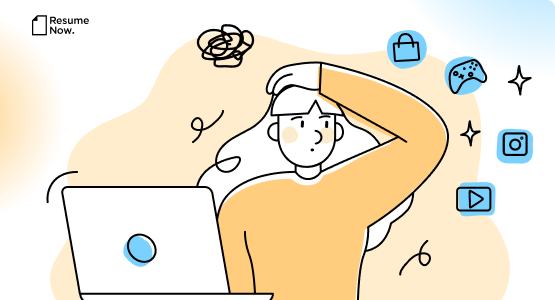Generative artificial intelligence is shaking up the job search world with a range of AI tools for just about any function. But with so much buzz surrounding AI, it can be challenging to determine what's truly useful and what's overhyped. Can AI really help you land a job?
The answer is yes! In our guide, we'll show you how to use AI to prepare for an interview and how to maximize generative AI's capabilities and limitations.
This guide will cover:
- A quick summary of what generative AI is, where it's useful and where it's limited.
- A rundown on how to use AI for interview prep, including sample prompts you can use right now.
- Key takeaways to remember as you prepare for your interview.
Need a resume to get your job search to the interview stage? Our Resume Builder makes the writing process fast and easy with pre-made stylish templates and thoughtful content suggestions based on your input.
What Is AI and How Can It Help You Get a Job?
First things first! Before we get into interview prep AI tips, we should discuss what AI is. Generative artificial intelligence is a technology trained on vast datasets, enabling it to generate new content — such as text, images and sounds — by combining and building upon patterns in the data.
But AI isn't producing anything new. It uses human input to decide what to produce. Everything it produces will be based on the data it's been trained on. Think of it like this: If you trained a generative AI model on fairytales and then asked it to describe a villain, it might remember that many of those stories feature evil witches, so there's a good chance it would return something similar.
All of this is to say that you can't treat generative AI like magic. Even the most popular tools, like ChatGPT, can only make predictions based on the data they've been fed.
Even though it isn't magic, AI can be extremely useful as a productivity tool and a sounding board. From testing out the questions you want to ask the interviewer to providing feedback on your resume, AI offers you a neutral set of (robot) eyes and ears to support you through your job search.
Next, let's look at some specific ways to use AI to prepare for your interview.
How to Use AI for Interview Prep (With Sample Prompts)
Now that we've covered what AI is, let's talk about what it can do! Think of ChatGPT, or whatever interview prep AI you use, as a personal assistant. It can't do your thinking for you, but it can streamline the process, give you new ideas and help you refine and organize your thoughts.
Use AI to prepare for your interview by:
Method #1
Asking the AI to review the job listing: Interview preparation means studying the job listing closely. You should understand what the employer is looking for in an ideal candidate so that you can anticipate the kinds of questions they'll ask you and the types of answers they'll expect. Ask the AI something like this:
Sample prompt:
"Review the following job listing and generate a list of skills and focus areas that an applicant should discuss in an interview."
A prompt like this will guide the AI toward isolating the keywords your interview prep should focus on. Plus, the AI may notice things you don't know about the job listing.
Method #2
Creating mockup interview questions: Nothing makes you feel prepared for an interview like knowing the answers to some of the most likely interview questions you'll receive.
Sample prompt:
"Use this job description to create a list of questions for an interviewer to ask in an interview. Include both common general interview questions and industry-specific targeted ones based on the job description."
It can be hard to know what skills interviewers are looking for. A prompt like this one has the double effect of analyzing the listing for potential job interview questions and giving the AI a chance to highlight some industry-specific questions and focus areas for you to be aware of.
AI makes mistakes, too! Don't be surprised if it misinterprets your questions or provides responses that don't make sense. That's why we're using it as a tool instead of a replacement for human intelligence. Try to use short and direct prompts when you can and correct the AI when its answers are wrong.
Method #3
Using the AI's knowledge base to learn about the role or company: While it cannot replace a well-vetted source's accuracy and authority, AI has access to a huge foundation of knowledge. If flexing your research skills, finding the right search terms to ask your questions and surfing the web for answers is too time-consuming, asking ChatGPT for an answer is a great alternative. Ask about trends in your industry and the reputation, culture and background of the company you're applying to.
Sample prompt:
"Provide a detailed overview of Company Inc.'s business, including its working culture, products, competitors and reputation."
Depending on the size of the company you're looking into, a generative AI might not have much to say, but it never hurts to try!
Method #4
Tasking the AI with creating a list of questions for you to ask: Asking questions in an interview can be intimidating. It can be tricky coming up with the right insightful question on the spot. That's why we recommend coming to the interview prepared with a few basic questions to ask. This will also help you think about what's important to you professionally and whether the role is a good fit. An AI helper can generate a list of questions quickly; even if you don't use all of them, they'll get your gears turning!
Sample prompt:
"Review the following job listing and create a list of questions for the interviewee to ask the interviewer."
Entering the interview with a list of questions handy will help you feel prepared and confident.
Method #5
Using an AI tool to review your resume: If you're already in the interview stage, odds are your resume is up to date, but it's still worth noting that AI can be really great for both resumes and cover letters. You can even use AI to help build your CV. It can't do all the work for you, but it can generate a basic resume based on your input or review your resume and provide feedback. Either way, make sure your voice is front and center.
Sample prompt:
"Please compare the following resume to the job listing below. Identify ways the candidate is a good fit and point out areas of improvement for the resume."
Before you get to the interview stage, a prompt like this one can be a great way to help your resume pass through applicant tracking systems (ATS) by helping you build a customized and targeted resume for each role you pursue.
Method #6
Doing a practice interview: Practice makes perfect! Use generative AI to roleplay your interview for practice as you prepare. A practice interview will help you anticipate the questions the employer might ask while also allowing you to try out your answers and see how the AI receives them. You can even ask the AI to grade your performance and give you an improvement plan to work on until you feel 100% ready to tackle the interview.
Sample prompt:
"Let's have a practice interview. I am applying for the job in the provided listing. Please ask me questions and respond to my answers as if this were a real interview."
Even if the AI doesn't behave exactly like a real interviewer, getting used to answering these types of questions will help you feel ready.
Key Takeaways
-
Understand what AI is and isn't capable of
If you expect ChatGPT to land you the job on its own, you're setting yourself up for disappointment. There's no replacing your brain and your hard work. AI can't produce anything without human input, so be prepared to tinker with it and think critically about the results.
-
Try identifying keywords
ChatGPT and similar AI platforms are great at distilling information. Feed it the job description for the role you're targeting, and it should create an interesting list of keywords that can help you decide on the skills you want to emphasize in the interview.
-
Use AI for research
AI cannot be trusted to provide completely accurate information consistently, but its knowledge is still vast and valuable. Use AI tools to learn about your industry, role or intended company and verify what you've learned through traditional research.
-
Create mockups
Getting a feel for the kinds of questions an interviewer might ask will help you feel confident and prepared. AI is perfect for this. Ask it to give you a list of questions, or go the extra mile by doing a mock interview with the AI as your interviewer.
Resources to Help With Your Job Search
- 21st Century Skills for Your Resume
- Networking Skills for Your Resume
- The Perfect Resume: A Detailed Guide for 2024 (+Examples)
- How to Write a CV: The Complete Guide for 2024
- How to List References for a Resume With No Experience
- How to Update Your Resume in 2024 (Guide + Expert Tips)
- How to Prepare for a Job Interview
Was this information helpful? Let us know!
Hailey Brophy is an experienced writer with a diverse career in digital publication. She is passionate about using her unique skills and experiences to help job seekers find the information that they need to succeed.
More resources

Hobbies and Interests to Put on Your Resume: Examples & Guide
Showcase individuality and drive by putting hobbies and intere...

How to List Relevant Coursework on a Resume (With Examples)
Wondering how to list relevant coursework on a resume to show ...

Engineering Resume: Examples, Templates & Tips for 2025
Build an engineering resume that s bound to impress recruiters...

Stationary Engineer Resume: Examples, Templates & Tips for 2025
Boost your career as a stationary engineer with our expertly c...

Medical Technologist Resume: Examples, Templates & Tips for 2025
Was this information helpful? Let us know &star &star &star &s...

